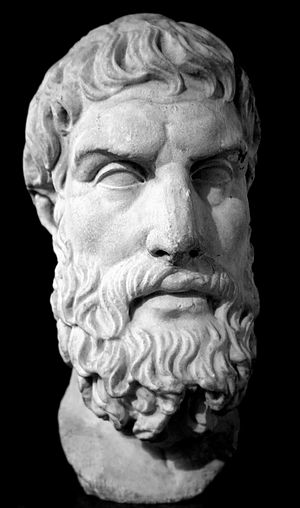Epicureanism facts for kids
Epicureanism is a way of thinking about life, based on the ideas of a Greek philosopher named Epicurus. This philosophy began around 307 BC. Epicurus believed that everything in the world is made of tiny particles called atoms. This idea was first suggested by another thinker, Democritus. Epicurus was a materialist, meaning he thought only physical things exist. He strongly disagreed with superstition.
Epicurus taught that the gods do not get involved in human affairs. He believed that the best way to live was to find certain pleasures. The goal was to reach a state where you felt no fear and no pain. Epicureanism is sometimes called a type of hedonism. This is because it says that pleasure is the only good thing. However, Epicureanism is different from common ideas of hedonism. It teaches that the greatest pleasure is actually the absence of pain. It also encourages living a simple life.
Contents
Finding True Happiness
Epicurus believed that the highest pleasure came from a calm mind and freedom from fear. You could get this by learning, having good friendships, and living a good, balanced life. He thought it was important to enjoy simple pleasures. He also meant avoiding strong desires, like always wanting more food or things. This was almost like a simple, disciplined way of living.
For example, Epicurus said you shouldn't eat too much rich food. He thought this could make you unhappy later. You might realize you can't always afford such fancy meals. Epicurus did not create a big system of social rules that we still use today.
Epicureanism Through History
Epicureanism first challenged the ideas of Platonism. Later, it became the main rival of Stoicism. Epicurus and his followers usually stayed away from politics. Many Epicurean groups thrived during the Hellenistic period and the Roman era. You could find them in places like Antioch, Alexandria, Rhodes, and Herculaneum.
The Roman poet Lucretius was a famous supporter of Epicureanism. He wrote a long poem called On the Nature of Things. This poem explains the main ideas of Epicureanism very well. By the end of the Roman Empire, Epicureanism almost disappeared. This was partly due to attacks and pressure from Christians. However, it was brought back in the 1600s by Pierre Gassendi. He was an atomist who changed Epicurean ideas to fit Christian beliefs.
Surviving Writings
Some of Epicurus's own writings have survived over time. Many ancient scrolls found at the Villa of the Papyri in Herculaneum are Epicurean texts. Some of these are thought to have belonged to an Epicurean named Philodemus.
Images for kids
-
Roman Epicurus bust
-
A manuscript of De rerum natura. This copy was made around 1483 for Pope Sixtus IV.
See also
 In Spanish: Epicureísmo para niños
In Spanish: Epicureísmo para niños
 | Roy Wilkins |
 | John Lewis |
 | Linda Carol Brown |




